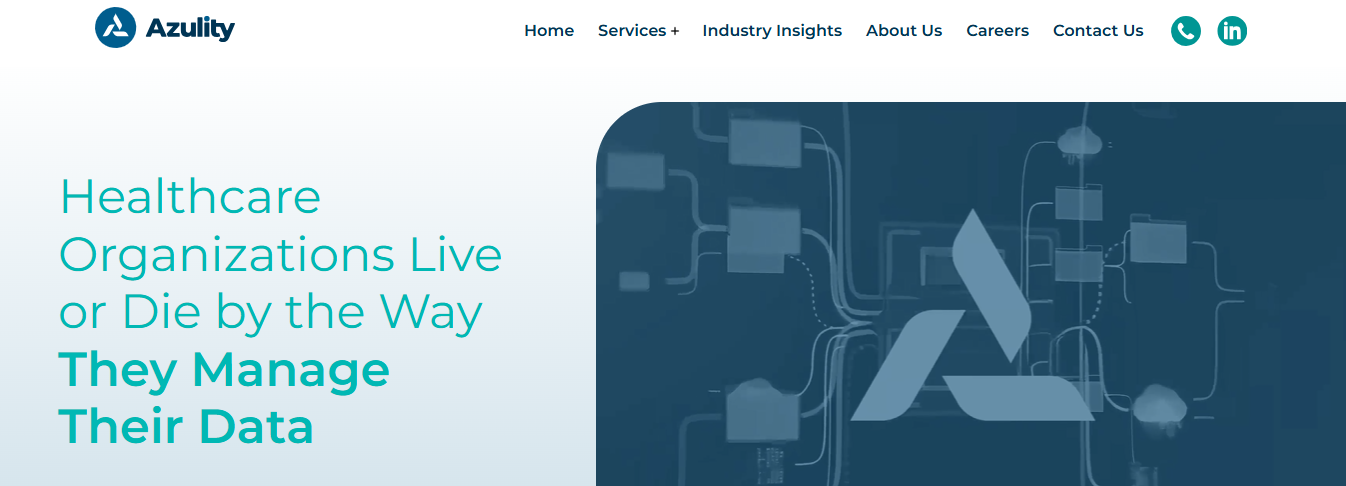In healthcare, the credentialing process can feel like a never-ending cycle of paperwork. When you think you’re done, someone transfers facilities, and you must start again. The situation can be frustrating for healthcare organizations and practitioners alike, especially considering that timely and accurate credentialing can directly impact patient care.
Understanding delegated credentialing can streamline operations, support timely access to care, and improve healthcare services, allowing them effective credentialing. This guide will explain delegated credentialing, explore its benefits, and illustrate how it fits within the healthcare credentialing workflow.
Azulity’s provider credentialing services can help you implement delegated credentialing at your organization. With our solutions, you can take the pressure off of your staff and quickly onboard new providers so you can focus on what matters—delivering quality patient care.
What Is Delegated Credentialing in Healthcare


Delegated credentialing in healthcare is when a healthcare organization gives its credentialing authority to another healthcare organization. For example, a preferred provider organization may legally ask a hospital to credential its providers. The delegated healthcare organization becomes responsible for making credentialing decisions on the delegating healthcare organization’s behalf.
They can verify a provider’s qualifications, state licensure, DEA registration, and work history. A delegated healthcare organization is responsible for reviewing and analyzing a provider’s qualifications and making credentialing decisions for delegating organizations. The delegated organization may require this data:
- Professional liability claims settlement history
- CDS (Controlled Dangerous Substance) certification
- Education
- Malpractice history
- DEA registration
- Sanctions & exclusions
- Disclosure questions
- Board certification
- State licensure
- Work history
- Hospital
- Attestation
However, a delegating organization is ultimately responsible for compliance with regulatory bodies and federal and state laws.
Why is Delegated Credentialing Beneficial?
Delegated credentialing can be a win-win strategy in many cases. While health plans are backlogged with verifications and enrollments, healthcare organizations want to speed up credentialing to get providers in front of patients sooner. Here’s a quick list of delegated credentialing benefits for health plans and organizations.
How Do Health Plans Benefit From Delegated Credentialing?
Health plans benefit from delegated credentialing in several ways, including:
- Time and resource efficiency. It helps save time and resources for health plans that are understaffed or overwhelmed with new enrollments.
- Cost reduction. Outsourcing credentialing to a delegate can help cut costs without hiring new staff internally.
- Faster network participation. It reduces the turnaround time for network participation, allowing more providers to enroll sooner.
- Managing provider volume. Enables management of a higher volume of providers to support network growth.
How Do Healthcare Organizations Benefit From Delegated Credentialing?
Healthcare organizations benefit from delegated credentialing in several ways, including:
- Quicker provider enrollment. It significantly reduces the time required for provider enrollment, often completing the process in less than two weeks.
- Faster turnaround for network participation. This leads to timelier reimbursements from payers, making financial planning easier.
- Efficient resource utilization. Depending on the terms of agreements, practices can reduce the time and resources spent on provider enrollment.
- Enhanced provider and patient satisfaction. New providers can quickly begin their work, benefiting patient care and satisfaction.
Related Reading
Importance of Delegated Credentialing in Healthcare


Speeding Up Provider Onboarding
One of the most significant advantages of delegated credentialing is speed. Traditional credentialing processes often involve multiple steps between payers and healthcare organizations, creating delays that hinder a provider’s ability to deliver care.
Delegated credentialing eliminates this back-and-forth by granting organizations the authority to credential providers directly. With this streamlined process, providers can begin practicing and billing for their services sooner, reducing revenue disruptions and improving patient access to care.
Elevating Provider and Payer Relationships
Delegated credentialing fosters a collaborative relationship between healthcare organizations and payers. Payers demonstrate confidence in the PLP team’s capabilities by entrusting credentialing responsibilities to the organization. This trust strengthens partnerships and creates opportunities for ongoing collaboration in other areas, such as quality improvement initiatives and compliance strategies.
Cost Savings for Both Parties
Credentialing is a labor-intensive process that requires significant administrative resources. When healthcare organizations delegate this responsibility, payers reduce their operational burden and associated costs. At the same time, organizations can leverage existing workflows and technology to manage credentialing more efficiently, resulting in cost savings on both sides. These efficiencies are particularly valuable for large health systems or organizations with a high volume of providers, where credentialing economies of scale can significantly impact the bottom line.
Improving Compliance and Accountability
Delegated credentialing doesn’t mean sacrificing oversight. Payers require organizations to meet strict accreditation standards—such as those set by the National Committee for Quality Assurance (NCQA)—before granting delegated authority. Regular audits and compliance reviews ensure credentialing processes align with industry standards and payer expectations. For PLPs, these standards allow them to showcase their expertise and maintain the organization’s credibility. Successfully managing delegated credentialing demonstrates the team’s ability to handle complex processes with precision and reliability.
Taking Control and Customizing Credentialing Processes
Delegated credentialing allows organizations to tailor credentialing processes to their unique needs. Instead of adhering to a payer’s predetermined workflow, PLPs can develop systems that align with their organization’s structure, resources, and goals.
This control extends to technology choices, data management practices, and workflow integration, enabling greater efficiency and consistency across credentialing efforts. When organizations have the flexibility to manage their processes, they can adapt more effectively to changes in payer requirements or regulatory updates.
Scalability for Growing Organizations
As healthcare organizations grow—whether through mergers, acquisitions, or the addition of new providers—credentialing demands often increase exponentially. Delegated credentialing offers a scalable solution, allowing organizations to manage more credentialing tasks without overwhelming payer systems. This scalability is particularly valuable in competitive markets, where rapid growth and provider expansion are essential to staying ahead.
Elevating the Role of PLPs
Delegated credentialing highlights the critical role PLPs play in healthcare organizations. By managing complex credentialing processes and maintaining compliance with rigorous standards, PLPs demonstrate their strategic value. Their expertise ensures that delegated credentialing is effective and a key contributor to organizational success.
7 Best Practices for Efficient Delegated Credentialing


1. Leverage Azulity for Efficient Credentialing


Consider Azulity as a resource. This organization specializes in healthcare master data management and credentialing services. Their expertise helps healthcare organizations eliminate the costly problems that arise from fragmented data systems. Azulity’s comprehensive platform ensures the consistent synchronization of patient, provider, location, and claims data across all systems and departments.
Key features include healthcare master data management, provider enrollment, reference data management, and credentialing. Azulity’s services benefit healthcare technology leaders, from CIOs and CDOs to VPs of data platforms and credentialing. If you’re looking to improve your delegated credentialing process, book a call with Azulity today.
2. Pre Delegation Assessment: Understand the Delegate’s Operations
Before you officially delegate any credentialing responsibilities, conduct a predelegation assessment. Start by understanding the full scope of operations of the potential delegate organization. This is particularly important for large medical groups that may be part of a healthcare system. They may be used to hospital credentialing processes, which can differ significantly from those of health plans.
3. Create a Delegation Agreement Early On
Credentialing management should be involved early on in the contracting process to review the activities being considered for delegation. By including all credentialing activities for which the delegated entity is qualified, the delegated entity can be used to its full potential— it’s to everyone’s advantage.
4. Review Accreditation and Certification Status
If a potential delegate is accredited or certified, less oversight is needed. Elements already reviewed and accepted by an accreditor do not require additional oversight by the health plan. Maintain a copy of the delegate’s current accreditation or certification in the delegate’s file to support surveyors’ review.
5. Educate All Staff on the Delegation Agreement
Ensure that credentialing staff are aware of what is included in the delegation agreement to expedite the pre assessment and oversight audit. Inform delegates of any policy changes, and provide sufficient time to make necessary updates.
6. Conduct Assessments Before the On-Site Audit
Perform a desktop review of policies, procedures, and committee minutes before an on-site audit to help identify potential areas of concern.
7. Streamline Audits to Reduce the Burden on Delegates
Consider electronic file reviews, if available, to streamline the process. Give delegated entities sufficient notice of audits (e.g., 30 days). This practice may be required in the contract. Be as flexible as possible with the audit date to minimize the impact to the delegate’s schedule. Consolidate audits with other payers when feasible to minimize duplication.
8. Provide Timely Notifications about Surveys and Audits
Provide delegates with as much notice as possible about upcoming survey activities and any required involvement, such as a file audit or an interview.
Related Reading
- Behavioral Health Credentialing Checklist
- Dentist Credentialing Checklist
- How to Do Credentialing in Healthcare
- Nurse Practitioner Credentialing Checklist
- Physician Credentialing Services Cost
Advantages of Delegated Credentialing


Accelerated Enrollment and Reimbursement
Delegated credentialing allows providers to get paid much faster. By expediting the insurance approval process and network participation, delegated credentialing helps practitioners bill and receive reimbursements sooner.
Streamlined Payer Enrollment
With delegated credentialing, providers no longer submit individual applications to each payer. Instead, they are added to a single roster that gets submitted in bulk. This improves tracking, reduces waste, and eliminates redundant work. Even when using shared solutions like CAQH Proview, delegation boosts efficiency in credentialing, directory maintenance, coordination of benefits, and other functions.
Enhanced Control Over Provider Data
Delegated credentialing gives organizations more control over how the network is reflected in payer directories. This includes demographic updates and changes to network participation, which occur constantly. With delegated credentialing, these changes are efficiently handled through rosters, ensuring provider data accuracy and directory compliance.
Boosted Provider and Patient Satisfaction
Faster onboarding enables providers to care for patients sooner, ensuring access to more practitioners, specialists, and convenient care locations. As a result, both patient and provider satisfaction improves.
Azulity specializes in healthcare master data management and provider credentialing services, bringing proven expertise in implementing healthcare data solutions and credentialing across the US. Our comprehensive platform ensures consistent patient, provider, location, and claims data synchronization across all systems and departments.
Key features include healthcare MDM, provider MDM, reference data management, credentialing, and provider enrollment. We serve healthcare technology leaders – from CIOs and CDOs to VPs of data platforms and credentialing – helping them eliminate the costly problems of fragmented data systems. Book a call to learn more about our healthcare master data management services today!
Book a Call to Learn More About Our Provider Credentialing Services
Credentialing takes time and resources. Delegated credentialing, or “re-credentialing,” is a way to streamline the process. It occurs when a health plan or payer transfers credentialing responsibilities to an outside organization. This organization is often a network or group designated by the health plan to perform these functions on its behalf. Delegated credentialing can help healthcare organizations avoid redundancy and expedite access to care.
